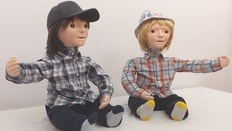Research and development
 Kaspar has been developed by the University of Hertfordshire’s Adaptive Systems Research Group, a multidisciplinary group that conducts pioneering research into artificial intelligence and robotics.
Kaspar has been developed by the University of Hertfordshire’s Adaptive Systems Research Group, a multidisciplinary group that conducts pioneering research into artificial intelligence and robotics.
The Group studies how humans and machines interact with each other, even using a typical semi-detached house in Hertfordshire – the Robot House – as a ‘real-world lab’ to explore how people might live alongside robots.
Building on research that stretches back to 1998, Professor Kerstin Dautenhahn and Dr Ben Robins have developed Kaspar into a working prototype that has met with significant success in trials with autistic children in various settings.
Feedback from teachers, health professionals and parents has enabled researchers to further redesign and develop Kaspar’s effectiveness in supporting children with autism.
Long-term studies carried out at specialist Hertfordshire early years centre TRACKS Autism and a primary school in Athens have demonstrated the benefits that interacting with Kaspar can bring to children with autism, and provided valuable feedback for design changes and increased usability. The results of these studies will be submitted to peer-reviewed academic journals shortly.
In 2016 the European Commission awarded Professor Dautenhahn's team more than £500,000 to develop more autonomous features for Kaspar, as part of the Horizon 2020 EU project Babyrobot. The aim is to use Kaspar to develop new multi-modal interaction technology that will allow several children with autism to play with the robot at the same time.
Key publications
Research into the effectiveness of Kaspar in supporting children with autism has been published in internationally renowned academic journals.
